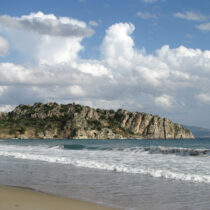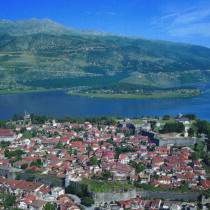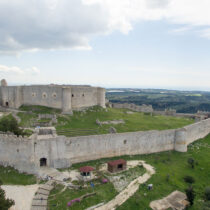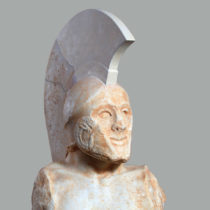‘Brutally murdered’ Pictish man brought back to life
Researchers from the University of Dundee’s CAHID have reconstructed the face of a Pictish man they showed to have been brutally murdered 1,400 years ago.
Collecting, clustering and evaluating in ancient Olympia
A three-year joint project has been launched between the Athens Department of the German Archaeological Institute and the Romano-Germanic Central Museum Mainz involving votive offerings in the Temple of Zeus at Olympia.
Late Antiquity burials found in Turkey
Three late antiquity burials have been discovered in Bursa, Turkey, at an olive grove where previously more archaeological finds had been unearthed.
The 2016 Polish excavations at Kato Pafos-Malloutena
This year's excavations at the site were limited to the area of the main courtyard of the “Hellenistic” House and the corridor between the “Roman House” and the “Hellenistic” House, nr 29.
Maniera Cypria: The Cypriot painting of the 13th century between two worlds
The exhibition aims to highlight the Cypriot painting during the 13th century and the ways of artistic symbiosis between two worlds, East and West.
Looking at Sardinian DNA for genetic clues to an island’s -and Europe’s- past
What were the origins of the Sardinian population in the context of European prehistory and ancient human migrations?
Ancient Greek and Roman Numismatics
The Institute of Historical Research of the National Hellenic Research Foundation is pleased to announce the organisation of its first Summer School on Ancient Greek and Roman Numismatics, to take place at its premises in Athens, from 3 to 12 July 2017.
Study rewrites the history of corn in corn country
A new study contradicts decades of thought, research and teaching on the history of corn cultivation in the American Bottom, a floodplain of the Mississippi River in Illinois.
The Berlin Painter and His World
Major international exhibition of classical Greek vases organized by Princeton University Art Museum.
Strolling with Power
Thomas Noble Howe will give a lecture about the gardens in elite maritime villas of Ancient Stabiae.
Ancient fossil reveals first evidence of live birth in animals thought to lay eggs
The first ever evidence of live birth in an animal group previously thought to lay eggs exclusively has been discovered by an international team of scientists.
Romanian skeleton puzzles archaeologists
An unusual and 'confusing' grave site dug up in Romania by a student from The Australian National University (ANU) is helping provide evidence for the first official written history of the Székely people.
Hundreds of illegally retrieved artefacts seized by Albania police
The smuggling of hundreds of artefacts from the Apollonia archaeological park has been prevented by Albanian police, according to a statement issued on Sunday.
Ancient jars found in Judea reveal earth’s magnetic field is fluctuating, not diminishing
New evidence says geomagnetic force 'spiked' in 8th century BCE, say Tel Aviv University, Hebrew University, UC San Diego researchers.
A human figure carved in stone 7000 years ago
The smaller than life-size statuette exhibit, shown in the NAM, clearly sums up the effort of the sculptor of the Final Neolithic to carve in the round this rare work, out of such a hard rock as granite, without having at his disposal metal tools.
Ancient temples found in Sudan offer new insight
An archaeologist from Switzerland has discovered three temples in Sudan dating back to 1,500-2,000 BC. The discovery, he says, will shed new light on African ancient past.
Digging deeper
Bournemouth University researchers are using new archaeological techniques and technologies to learn more about an iconic Islamic palace in Southern Spain.
Stolen sarcophagus returns to Greece
The fragment of the marble sarcophagus which had been stolen in 1988 and has been travelling for 30 years in Europe and the USA returns to Greece.
A kiss of death
Living in the Karoo, near Colesberg in South Africa, the Euchambersia developed a deep and circular fossa, just behind its canine teeth in the upper jaw, in which a deadly venomous cocktail was produced.
Egyptian artefact is repatriated after studies
A 35,000-year-old axe has been returned to Egypt by the Leuven University in Belgium.
A fascinating glimpse into past Roman and Iron Age communities
Preliminary works for a relief road in Lincolnshire have provided a fascinating glimpse into past Roman and Iron Age communities, settlements and landscapes in the area.
Were early humans forced to start farming or not?
Foraging lifestyles persisted in New Guinean tropical forest environments even after the advent of farming 8,000 years ago.
Fossil treasure-trove reveals post-extinction world ruled by sponges
A joint team of researchers from China and Britain have revealed a new fossil fauna preserving delicate skeletons and soft tissues, from the immediate aftermath of the Ordovician mass extinction.
Fossilised tree and ice cores help date 1,000 year-old volcanic eruption
An international team of researchers has managed to pinpoint, to within three months, a medieval volcanic eruption in east Asia the precise date of which has puzzled historians for decades.




























